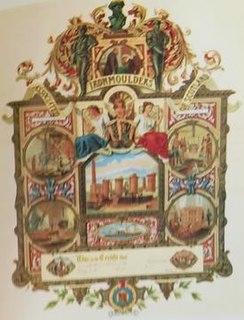Related Research Articles
John Hodge was a Coalition Labour party politician in the United Kingdom, and was the first Minister of Labour and the second Minister of Pensions.

The Iron and Steel Trades Confederation (ISTC) was a British trade union for metal-workers and allied groups, being the largest union in these fields. It was formed on 1 January 1917 as a merger of existing steel-workers' unions and it is now part of Community.
The United Order of General Labourers was a trade union representing labourers, mostly in the construction industry, in the United Kingdom.

The National Union of Scottish Mineworkers (NUSW) is a trade union in Scotland, founded in 1894 as the Scottish Miners Federation. It joined the Miners' Federation of Great Britain, and in 1914 changed its name to National Union of Scottish Mineworkers. It survives as the National Union of Mineworkers.

The Confederation of Shipbuilding and Engineering Unions (CSEU), often known as the Confed is a trade union confederation in the United Kingdom.
The National Union of Blastfurnacemen, Ore Miners, Coke Workers and Kindred Trades (NUB) was a trade union in England and Wales which existed between 1888 and 1985. It represented process workers in the British iron and steel industry.
The Wire Workers' Union was a trade union in England which existed between 1840 and 1991. It represented workers involved in the manufacture of wire.
The Associated Metalworkers' Union was a trade union in the United Kingdom which existed between 1863 and 1999. It represented semi-skilled foundry workers known as iron dressers or fettlers, who were responsible for removing moulding sand and excess metal from castings.
The Associated Iron and Steel Workers of Great Britain was a trade union representing people employed in iron- and steelworks in Britain.
The Tin and Sheet Millmen's Association was a trade union representing millmen in the metalworking industry in the United Kingdom.
The Amalgamated Textile Warehousemen's Association was a trade union representing workers in the textile industry in the United Kingdom, principally in Lancashire.
The Miners' National Union (MNU) was a trade union which represented miners in Great Britain.
The Amalgamated Society of Steel and Iron Workers of Great Britain was a trade union representing workers in iron- and steelworks, principally in Scotland.

The Associated Iron Moulders of Scotland (AIMS) was a trade union representing foundry workers in Scotland.
The National Steel Workers' Associated Engineering and Labour League was a trade union representing steel workers in England.
The National Union of Textile Workers was a trade union representing workers in the textile industry in England, principally in Yorkshire.
The Power Loom Carpet Weavers' and Textile Workers' Union (PLCWTWU) was a trade union representing workers in the textile industry in the Kidderminster area of England.
The National Amalgamated Association of Tin Plate Workers of Great Britain was a trade union representing sheet metal workers in the United Kingdom.
The Amalgamated Society of Enginemen, Cranemen and Firemen was a trade union in the United Kingdom. It represented stationary engine drivers and cranemen in a wide variety of industries.
The Customs and Excise Federation was a trade union federation representing civil servants in the United Kingdom.
References
- 1 2 Arthur Marsh and Victoria Ryan, Historical Directory of British Trade Unions, vol.II, p.274
- ↑ Marsh, Arthur; Ryan, Victoria (1987). Historical Directory of Trade Unions. 3. Aldershot: Gower Publishing. pp. 454-457. ISBN 0566021625.